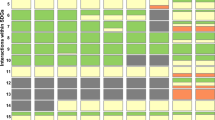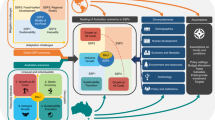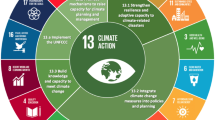Abstract
The Sustainable Development Goals (SDGs) and the Paris Agreement on Climate Change call for deep transformations in every country that will require complementary actions by governments, civil society, science and business. Yet stakeholders lack a shared understanding of how the 17 SDGs can be operationalized. Drawing on earlier work by The World in 2050 initiative, we introduce six SDG Transformations as modular building-blocks of SDG achievement: (1) education, gender and inequality; (2) health, well-being and demography; (3) energy decarbonization and sustainable industry; (4) sustainable food, land, water and oceans; (5) sustainable cities and communities; and (6) digital revolution for sustainable development. Each Transformation identifies priority investments and regulatory challenges, calling for actions by well-defined parts of government working with business and civil society. Transformations may therefore be operationalized within the structures of government while respecting the strong interdependencies across the 17 SDGs. We also outline an action agenda for science to provide the knowledge required for designing, implementing and monitoring the SDG Transformations.
This is a preview of subscription content, access via your institution
Access options
Access Nature and 54 other Nature Portfolio journals
Get Nature+, our best-value online-access subscription
$29.99 / 30 days
cancel any time
Subscribe to this journal
Receive 12 digital issues and online access to articles
$119.00 per year
only $9.92 per issue
Buy this article
- Purchase on Springer Link
- Instant access to full article PDF
Prices may be subject to local taxes which are calculated during checkout


Similar content being viewed by others
References
TWI2050 Transformations to Achieve the Sustainable Development Goals (International Institute for Applied Systems Analysis, 2018).
IPCC: Summary for Policymakers. In Global Warming of 1.5 °C (eds Masson-Delmotte, V. et al.) (World Meteorological Organization, 2018).
Transforming Our World: The 2030 Agenda for Sustainable Development (United Nations, 2015).
McArthur, J. W. & Rasmussen, K. Change of pace: accelerations and advances during the Millennium Development Goal era. World Dev. 105, 132–143 (2018).
Review of the Sustainable Development Goals: The Science Perspective (International Council for Science, International Social Science Council, 2015).
Nilsson, M., Griggs, D. & Visbeck, M. Policy: map the interactions between Sustainable Development Goals. Nature 534, 320–322 (2016).
UN Millennium Project Investing in Development: A Practical Plan to Achieve the MDGs (Earthscan, 2005).
Sachs, J. D., Schmidt-Traub, G. & Williams, J. Pathways to zero emissions. Nat. Geosci. 9, 799–801 (2016).
Hanushek, E. A. & Woessmann, L. Do better schools lead to more growth? Cognitive skills, economic outcomes, and causation. J. Econ. Growth 17, 267–321 (2012).
Lutz, W., Cuaresma, J. C. & Sanderson, W. The demography of educational attainment and economic growth. Science 319, 1047–1048 (2008).
Bengtsson, S., Barakat, B. & Muttarak, R. The Role of Education in Enabling the Sustainable Development Agenda (Routledge, 2018).
Daelmans, B. et al. Early childhood development: the foundation of sustainable development. Lancet 389, 9–11 (2017).
Global Education Monitoring Report 2017/18: Accountability in Education: Meeting Our Commitments (UNESCO, 2017).
Tackling Inequality (International Monetary Fund, 2017).
Manyika, J. et al. Jobs Lost, Jobs Gained: Workforce Transitions in a Time of Automation (McKinsey Global Institute, 2017).
Rules of the Game: A Brief Introduction to International Labour Standards (International Labor Organization, 2014).
Sala-i-Martin, X., Doppelhofer, G. & Miller, R. I. Determinants of long-term growth: a Bayesian averaging of classical estimates (BACE) approach. Am. Econ. Rev. 94, 813–835 (2004).
Mazzucato, M. Mission-oriented innovation policies: challenges and opportunities. Ind. Corp. Change 27, 803–815 (2018).
Towards a Global Action Plan for Healthy Lives and Well-Being for All (WHO, 2018).
Graham, C., Laffan, K. & Pinto, S. Well-being in metrics and policy. Science 362, 287–288 (2018).
GBD 2015 SDG Collaborators. Measuring the health-related Sustainable Development Goals in 188 countries: a baseline analysis from the Global Burden of Disease Study 2015. Lancet 388, 1813–1850 (2016).
Helliwel, J. F., Layard, R. & Sachs, J. D. World Happiness Report 2019 (Sustainable Development Solutions Network, 2019).
Glasier, A., Gülmezoglu, A. M., Schmid, G. P., Moreno, C. G. & Van Look, P. F. Sexual and reproductive health: a matter of life and death. Lancet 368, 1595–1607 (2006).
Willett, W. et al. Food in the Anthropocene: the EAT–Lancet Commission on healthy diets from sustainable food systems. Lancet 393, 447–492 (2019).
Afshin, A. et al. Health effects of dietary risks in 195 countries, 1990–2017: a systematic analysis for the Global Burden of Disease Study 2017. Lancet 393, 1958–1972 (2019).
World Energy Outlook Special Report 2017: Energy Access Outlook (International Energy Agency, 2017).
World Energy Outlook Special Report 2016: Energy and Air Pollution (International Energy Agency, 2016).
Kümmerer, K., Dionysiou, D. D., Olsson, O. & Fatta-Kassinos, D. A path to clean water. Science 361, 222–224 (2018).
Davis, S. J. et al. Net-zero emissions energy systems. Science 360, eaas9793 (2018).
Kuramochi, T. et al. Ten key short-term sectoral benchmarks to limit warming to 1.5 °C. Clim. Policy 18, 287–305 (2018).
Waisman, H. et al. A pathway design framework for national low greenhouse gas emission development strategies. Nat. Clim. Change 9, 261–268 (2019).
Williams, J. H. et al. The technology path to deep greenhouse gas emissions cuts by 2050: the pivotal role of electricity. Science 335, 53–59 (2012).
Searchinger, T. D., Wirsenius, S., Beringer, T. & Dumas, P. Assessing the efficiency of changes in land use for mitigating climate change. Nature 564, 249–253 (2018).
Wiedmann, T. O. et al. The material footprint of nations. Proc. Natl Acad. Sci. USA 112, 6271–6276 (2015).
Farmer, J. D. et al. Sensitive intervention points in the post-carbon transition. Science 364, 132–134 (2019).
Poore, J. & Nemecek, T. Reducing food’s environmental impacts through producers and consumers. Science 360, 987–992 (2018).
Ramankutty, N. et al. Trends in global agricultural land use: implications for environmental health and food security. Annu. Rev. Plant Biol. 69, 789–815 (2018).
Brondizio, E. S. et al. (eds) Global Assessment Report on Biodiversity and Ecosystem Services of the Intergovernmental Science-Policy Platform on Biodiversity and Ecosystem Services (IPBES, 2019).
Ingeman, K. E., Samhouri, J. F. & Stier, A. C. Ocean recoveries for tomorrow’s Earth: hitting a moving target. Science 363, eaav1004 (2019).
Stevens, C. J. Nitrogen in the environment. Science 363, 578–580 (2019).
Steffen, W. et al. Planetary boundaries: guiding human development on a changing planet. Science 347, 1259855 (2015).
Schmidt-Traub, G., Obersteiner, M. & Mosnier, A. Fix the broken food system in three steps. Nature 569, 181–183 (2019).
Pretty, J. Intensification for redesigned and sustainable agricultural systems. Science 362, eaav0294 (2018).
Sala, E. et al. The economics of fishing the high seas. Sci. Adv. 4, eaat2504 (2018).
Bryan, B. A. et al. China’s response to a national land-system sustainability emergency. Nature 559, 193–204 (2018).
FAO, IFAD, UNICEF, WFP & WHO The State of Food Security and Nutrition in the World 2017: Building Resilience for Peace and Food Security (Food and Agriculture Organization, 2017).
Ferreira, M. A. Environmental Planning for Oceans and Coasts: Methods, Tools, and Technologies (The Coastal Education and Research Foundation, 2018).
Jiang, L. & O’Neill, B. C. Global urbanization projections for the Shared Socioeconomic Pathways. Glob. Environ. Change 42, 193–199 (2017).
Kraas, F. et al. Humanity on the Move: Unlocking the Transformative Power of Cities (WBGU, 2016).
Rosenzweig, C. et al. Climate Change and Cities: Second Assessment Report of the Urban Climate Change Research Network (Cambridge Univ. Press, 2018).
Slums Almanac 2015/2016: Tracking Improvement in the Lives of Slum Dwellers (UN Habitat, 2016).
Progress on Drinking-Water and Sanitation (World Health Organization and United Nations Children’s Emergency Fund, 2016).
Sustainable Development Goal 6: Synthesis Report on Water and Sanitation 2018 (United Nations, 2018).
Sustainability Transformations in the Digital Age (WBGU, 2019).
Broadband Commission Means of Transformation: Harnessing Broadband for the Post-2015 Development Agenda (United Nations Educational Scientific and Cultural Organization, International Telecommunication Union and Ericsson, 2014).
Dharmapala, D. What do we know about base erosion and profit shifting? A review of the empirical literature. Fisc. Stud. 35, 421–448 (2014).
Frischmann, B. M., Madison, M. J. & Strandburg, K. J. Governing Knowledge Commons (Oxford Univ. Press, 2014).
Rosol, C., Nelson, S. & Renn, J. Introduction: in the machine room of the Anthropocene. Anthrop. Rev. 4, 2–8 (2017).
Mazzucato, M. The Entrepreneurial State: Debunking Public vs. Private Sector Myths (Anthem, 2015).
Gaspar, V., Amaglobeli, D., Garcia-Escribano, M., Prady, D. & Soto, M. Fiscal Policy and Development: Human, Social, and Physical Investment for the SDGs (International Monetary Fund, 2019).
OECD. Policy coherence. In 27th Session on the Public Management Committee GOV/PUMA(2003)4 (OECD, 2003); https://go.nature.com/2ys8c3E
Leach, M. et al. Equity and sustainability in the Anthropocene: a social-ecological systems perspective on their intertwined futures. Glob. Sustain. 1, e13 (2018).
Perez, C. Capitalism, technology and a green global age: the role of history in helping to shape the future. Polit. Q. 86, 191–217 (2015).
Grin, J., Rotmans, J. & Schot, J. Transitions to Sustainable Development: New Directions in the Study of Long Term Transformative Change (Routledge, 2010).
Morrison, G. M. et al. Comparison of low-carbon pathways for California. Clim. Change 131, 545–557 (2015).
Weitzel, M. et al. Model-based assessments for long-term climate strategies. Nat. Clim. Change 9, 345–347 (2019).
Ostrom, E. Beyond markets and states: polycentric governance of complex economic systems. Am. Econ. Rev. 100, 641–672 (2010).
Lang, D. J. et al. Transdisciplinary research in sustainability science: practice, principles, and challenges. Sustain. Sci. 7, 25–43 (2012).
Nowak, M. A. Five rules for the evolution of cooperation. Science 314, 1560–1563 (2006).
Messner, D. A social contract for low carbon and sustainable development: reflections on non-linear dynamics of social realignments and technological innovations in transformation processes. Technol. Forecast. Soc. Change 98, 260–270 (2015).
Alva, R. Sustainable development in the light of the teachings of the encyclical Laudato Si. Eur. J. Sustain. Dev. 5, 177–186 (2016).
Messner, D. & Weinlich, S. in Global Cooperation and the Human Factor in International Relations (eds Messner, D. & Weinlich, S.) 3–47 (Routledge, 2015).
Governing the Marine Heritage (WBGU, 2013).
Education Commission The Learning Generation: Investing in Education for a Changing World (The International Commission on Financing Global Education Opportunity, 2016).
Krabbe, O. et al. Aligning corporate greenhouse-gas emissions targets with climate goals. Nat. Clim. Change 5, 1057–1060 (2015).
Miedzinski, M., Mazzucato, M. & Ekins, P. A Framework for Mission-Oriented Innovation Policy Roadmapping for the SDGs (UCL Institute for Innovation and Public Purpose, 2019).
Sachs, J. D. & Schmidt-Traub, G. Global Fund lessons for Sustainable Development Goals. Science 356, 32–33 (2017).
Schmidt-Traub, G., Kroll, C., Teksoz, K., Durand-Delacre, D. & Sachs, J. D. National baselines for the Sustainable Development Goals assessed in the SDG Index and Dashboards. Nat. Geosci. 10, 547–555 (2017).
Stahel, W. R. The circular economy. Nature 531, 435–438 (2016).
Olivetti, E. A. & Cullen, J. M. Toward a sustainable materials system. Science 360, 1396–1398 (2018).
Herrero, M. et al. Biomass use, production, feed efficiencies, and greenhouse gas emissions from global livestock systems. Proc. Natl Acad. Sci. USA 110, 20888–20893 (2013).
de Boer, I. J. M. & Ittersum, M. K. Circularity in Agricultural Production (Wageningen Univ., 2018).
Acknowledgements
We thank S. Busch, G. Clarke, O. Gaffney, E. Kriegler, P. Kolp, J. Leininger, K. Riahi, S. van der Leeuw, D. van Vuuren and C. Zimm, who are co-authors of the TWI2050 Synthesis. D. Strüber provided research assistance.
Author information
Authors and Affiliations
Contributions
J.D.S. provided the initial idea for this paper. G.S.-T. coordinated the writing and prepared the Supplementary Information. All authors contributed to every phase of the study.
Corresponding author
Ethics declarations
Competing interests
The authors declare no competing interests.
Additional information
Publisher’s note: Springer Nature remains neutral with regard to jurisdictional claims in published maps and institutional affiliations.
Supplementary information
Supplementary Information
Supplementary Notes, Supplementary Figure 1, Supplementary Table 1, Supplementary References 1–171
Rights and permissions
About this article
Cite this article
Sachs, J.D., Schmidt-Traub, G., Mazzucato, M. et al. Six Transformations to achieve the Sustainable Development Goals. Nat Sustain 2, 805–814 (2019). https://doi.org/10.1038/s41893-019-0352-9
Received:
Accepted:
Published:
Issue Date:
DOI: https://doi.org/10.1038/s41893-019-0352-9
This article is cited by
-
Modelling six sustainable development transformations in Australia and their accelerators, impediments, enablers, and interlinkages
Nature Communications (2024)
-
CO2 hydrogenation over Fe-Co bimetallic catalysts with tunable selectivity through a graphene fencing approach
Nature Communications (2024)
-
Assessing and addressing the global state of food production data scarcity
Nature Reviews Earth & Environment (2024)
-
Assumptions and contradictions shape public engagement on climate change
Nature Climate Change (2024)
-
Assessing the sustainability of the European Green Deal and its interlin kages with the SDGs
npj Climate Action (2024)



